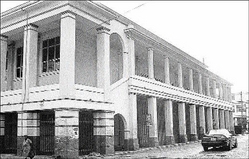Understanding the justice system reform framework
Published: Monday | December 14, 2009

The Supreme Court building in downtown Kingston: The Ministry of Justice has provided three civil courtrooms at the conference centre, allowing for three additional criminal courtrooms at the Supreme Court. - file
Tanisha Grantwants to know where the Ministry of Justice is in implementing recommendations of the Jamaica Justice System Reform Task Force Report, specifically as it relates to ensuring that cases in the courts are addressed in a timely manner.
The Jamaica Justice System Reform Task Force was set up to provide guidance in a comprehensive review of the state of the justice system and to make practical and achievable recommendations that would lead to the modernisation of the justice sector. The task force made nearly 200 recommendations for reform of the justice system. In an effort to implement these recommendations, the Justice System Reform Policy Agenda Framework (the Framework) was developed with a five-year implementation schedule.
The framework sets out seven strategic objectives, together with a time-phased action plan, including costings for the future design and implementation of transformation initiatives for the justice sector in the short, medium and long term. These objectives are:
1. Ensuring the fair and timely resolution of cases
2. Improving access to justice
3. Strengthening the judiciary and workforce
4. Strengthening linkages between justice sector institutions
5. Establishing a sound court infrastructure
6. Implementing a social component to the delivery of justice
7. Strengthening public trust and confidence in the justice system.
The Ministry of Justice is focusing on three of the seven strategic objectives this financial year. These are:
Ensuring the fair and timely resolution of cases.
Strengthening public trust and confidence in the justice system.
Establishing a sound court infrastructure.
The ministry has begun implementing more than 70 of the recommendations. Fourteen have been referred to the Ministry of National Security, as they fall within its portfolio area. About nine recommendations have been determined to require further assessment before implementation, while some 80 recommendations have not yet been implemented but are scheduled to be implemented over the next five years.
Fair and timely resolution of cases

To achieve fair and timely resolution of cases, the ministry has sought to increase the complement of judges so as to expand the courts' capacity to hear cases. The ministry has also provided three civil courtrooms at the conference centre. This has allowed for three additional criminal courtrooms at the Supreme Court.
This past year, Parliament passed amendments to the Judicature (Supreme Court) Act and the Judicature (Appellate Jurisdiction) Act. These amendments made it possible for an additional 16 judges to be appointed to the Supreme Court and an additional six judges to the Court of Appeal. The amendments also made it possible to appoint three additional Masters in Chambers, bringing the complement to four. Provision has also been made for eight additional resident magistrates.
The ministry is in the process of repairing three outstations and it is proposed to use them on a daily basis to assist with the backlog in the RM courts. These outstations are Claremont in St Ann, Cambridge in St James, and Balaclava in St Elizabeth.
Appointment of the additional judges to the Supreme Court and Court of Appeal now awaits the availability of physical space, which will be created with the expansion of the Supreme Court facilities in Justice Square.
The Jury Act
Parliament also passed amendments to the Jury Act to widen the pool from which jurors can be selected. A large problem over the years has been an inability to hear cases because of juror shortage. This has been a contributing factor to the growth of the backlog. Previously, jurors could only be selected from those between the ages of 18 and 65 years and who were listed on the voters' list. With the recent amendments, the age limit has been increased to 70 years and jurors may now be selected using Taxpayer Registration Numbers (TRN). There have been some delays in procuring an updated list but it is expected that the new selection process will begin by the end of this calendar year.
The amendment to the Jury Act also transferred the responsibility for the service of summonses to jurors from the commissioner of police to the registrar of the supreme court. This will allow the registrar to better administer and monitor the serving of summonses.
The ministry will also be moving to restorative and community justice practices with the aim of reducing the pressure on the formal court system.
Increase in the number of prosecutors
The delays experienced in the resolution of cases have also been affected by the backlog of cases in the Office of the Director of Public Prosecutions (DPP). Approval has been granted to increase the number of prosecutors in the Office of the DPP by 12. To date, the office Office of the DPP has employed seven additional prosecutors and engaged eight former prosecutors to assist in the reduction of the backlog of cases in that office and the prosecution of cases.
These are some of the many initiatives that are being pursued in keeping with the recommendations of the report of Justice System Reform Task Force and within the parameters of the Policy Agenda Framework to effectively address the backlog of cases in the courts.
*Name changed
In The Name of Justice is a collaboration between The Gleaner and the Ministry of Justice. Send questions, comments and









